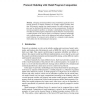Free Online Productivity Tools
i2Speak
i2Symbol
i2OCR
iTex2Img
iWeb2Print
iWeb2Shot
i2Type
iPdf2Split
iPdf2Merge
i2Bopomofo
i2Arabic
i2Style
i2Image
i2PDF
iLatex2Rtf
Sci2ools
106
click to vote
FORTE
2008
2008
Protocol Modeling with Model Program Composition
Designing and interoperability testing of distributed, application-level network protocols is complex. Windows, for example, supports currently more than 200 protocols, ranging from simple protocols for email exchange to complex ones for distributed file replication or real time communication. To fight this increasing complexity problem, we introduce a methodology and formal framework that uses model program composition to specify behavior of such protocols. A model program can be used to specify an increment of protocol functionality with a coherent purpose, which can be understood and analyzed separately. The overall behavior of a protocol can be defined by a composite model program, which defines how the individual parts interoperate.
Application-level Network Protocols | Formal Methods | FORTE 2008 | Model Program | Model Program Composition |
Related Content
| Added | 29 Oct 2010 |
| Updated | 29 Oct 2010 |
| Type | Conference |
| Year | 2008 |
| Where | FORTE |
| Authors | Margus Veanes, Wolfram Schulte |
Comments (0)

